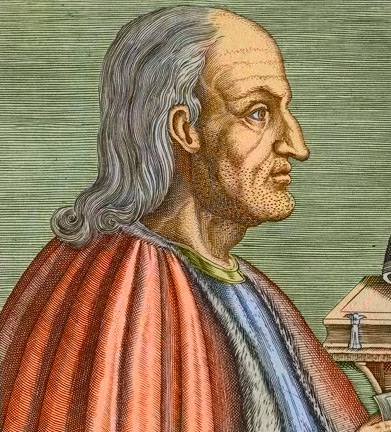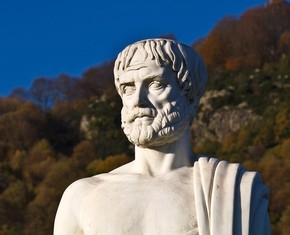The views expressed in our content reflect individual perspectives and do not represent the authoritative views of the Baha'i Faith.
…all the atoms of the earth proclaim that there is none other God but Him, the One, the Single, the Mighty, the Loving. – Baha’u’llah, The Summons of the Lord of Hosts, p. 23.
When my rational, agnostic friend and I discussed the existence of God, she usually wound up asking this question: “But how can you actually prove that God exists?”
“A Benedictine monk and philosopher proved it a thousand years ago,” I said. “He was a student of ontology—the science of what actually exists and has being. Check out what he said.”
 In 1078 Anselm of Canterbury first proposed this proof of the existence of God in his essay Proslogion:
In 1078 Anselm of Canterbury first proposed this proof of the existence of God in his essay Proslogion:
Humans can imagine a being “which nothing greater can be conceived”
This being exists in the mind of humanity
If the greatest possible being exists in the mind, it must also exist in reality.
Descartes expanded on Anselm’s fascinating and quite subtle ontological argument, saying that God exists because we have a “clear and distinct” concept of a supremely perfect being.
The legendary and influential Islamic philosopher Mulla Sadra, in his main philosophical work al-asfar al-arba‘a (Four Journeys), put forward a similar proof, which he called the Argument of the Righteous:
There is existence; and we cannot conceive of a more perfect existence
By definition God is perfection personified
Existence is one—no metaphysical pluralism exists
Existence has grades of perfection
The scale of perfection must have a limit point—a point of greatest intensity
That greatest intensity, by definition, is God.
All of these ontological proofs of the existence of a Supreme Being pivot around this subtle point of greatness and perfection.
We humans are imperfect creatures. We didn’t create the universe–we just occupy one small planet in its vastness. We aren’t superheroes with super-powers, despite all the books, films and games that imagine such an empowering state of existence—instead, we’re relatively weak and powerless individuals. That reality defines us, and also makes it possible for us to somehow grasp the concept of a Creator, a Great Spirit, an Ultimate Being. The Baha’i teachings say that these essential dualities of life—weakness and strength, dependence and independence, powerlessness and might, and so on—make it obvious that the scale of perfection does have a limit point called God:
Among the proofs and arguments for the existence of God is the fact that man has not created himself, but rather that his creator and fashioner is another than he. And it is certain and indisputable that the creator of man is not like man himself, because a powerless being cannot create another being, and an active creator must possess all perfections to produce his handiwork.
Is it possible for the handiwork to be perfect and the craftsman imperfect? Is it possible for a painting to be a masterpiece and the painter to be deficient in his craft, notwithstanding that he is its creator? No: the painting cannot be like the painter, for otherwise it would have painted itself. And no matter how perfect the painting may be, in comparison with the painter it is utterly deficient.
Thus the contingent world is the source of deficiencies and God is the source of perfection. The very deficiencies in the contingent world testify to God’s perfections. For example, when you consider man, you observe that he is weak, and this very weakness of the creature betokens the power of One Who is Eternal and Almighty; for were it not for power, weakness could not be imagined… Without power there could be no weakness. This weakness makes it evident that there is a power in the world.
…It is certain that the entire contingent world is subject to an order and a law which it can never disobey. Even man is forced to submit to death, sleep and other conditions—that is, in certain matters he is compelled, and this very compulsion implies the existence of One Who is All-Compelling. So long as the contingent world is characterized by dependency, and so long as this dependency is one of its essential requirements, there must be One Who in His own Essence is independent of all things.
…throughout the world of existence the smallest created thing attests to the existence of a creator. For instance, this piece of bread attests that it has a maker.
Gracious God! The change in the outward form of the smallest thing proves the existence of a creator: Then how could this vast, boundless universe have created itself and come to exist solely through the mutual interaction of the elements? How patently false is such a notion! – Abdu’l-Baha, Some Answered Questions (newly revised edition), pp. 6-7.
You May Also Like
Comments

















When I was young, I was a naturalist. I though that humans and nature were just naturally good. When I went to college, I learned that there had been babies that had been either abandoned in the wilderness, or their parents had passed away leaving the babies. The babies had then been raised by monkeys. When the babies grew up, they exhibited the exact same characteristics as the monkeys did and none of human. ie. They did NOT grow up to be smart, loving and intelligent people.
This proved ...that knowledge was NOT inherently within the child. That human's were not born with knowledge. If humans were not born with knowledge, then it must come from outside ourselves. This proved to me that the source must be God.
The knowledge of God flows as a spring of knowledge through the chosen Prophets or Manifestations of God. They are the Divine educators of humanity. Without this Divine knowledge, humanity would remain ignorant, and bereft of all good human qualities. We are essentially, a mirror, when polished, reflecting the Divine attributes of God. Randy Focht. Contact me on Facebook.